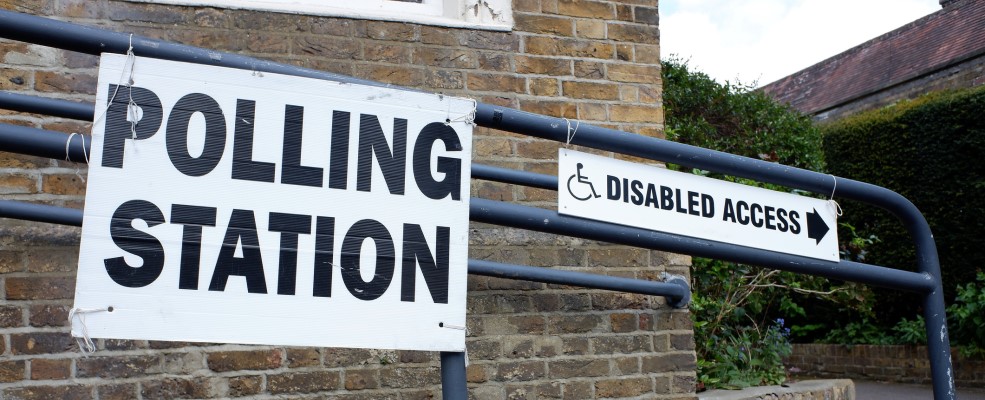Mae papur newydd am Astudiaethau Etholiadol gan Ralph Scott ym Mhrifysgol Bryste a Melanie Jones ym Mhrifysgol Caerdydd yn trin a thrafod dylanwad anabledd ar ddewisiadau pleidiau gwleidyddol.
Er y ceir sylfaen dystiolaeth sy’n dod i’r amlwg ar yr effaith y mae anabledd yn ei chael ar y bobl sy’n pleidleisio (gan gynnwys papur diweddar a ysgrifennwyd gan Melanie a Samuel Brown), mae’r rôl y mae anabledd – a ddiffinnir i olygu cyflyrau iechyd yn y tymor hir sy’n cyfyngu ar weithgareddau sy’n gyson â Deddf Cydraddoldeb y DU 2010 – yn ei chael ar ymagweddau ac ymddygiad gwleidyddol eraill heb ei ystyried o hyd.
Yn y papur rydyn ni’n mynd i’r afael â’r bwlch hwn, gan ddefnyddio data cynrychioliadol yn genedlaethol ar 51,597 o ymatebwyr i Understanding Society i gynnig dadansoddiad cynhwysfawr o’r berthynas rhwng anabledd a chefnogaeth bleidiol.
Ar ôl cymryd nodweddion demograffig i ystyriaeth, rydyn ni’n gweld bod pobl anabl yn llai tebygol o gefnogi gwleidyddiaeth yr adain-dde, ac yn fwy tebygol o gefnogi pleidiau protest.
Mae hyn yn unol â’n disgwyliadau, sydd wedi’i ffurfio yn seiliedig ar dystiolaeth bresennol sy’n dangos bod gan bobl anabl ddewisiadau polisi yn fwy unol â phleidiau y chwith (gwariant cyhoeddus uwch, yn enwedig ar ofal iechyd) ond hefyd yn fwy tebygol o wrthod y prif ffrwd a chefnogi mudiadau protest.
Mewn termau cymharol gyffredinol, ar ôl cymryd effeithiau cyfansoddol (oedran, rhyw, rhanbarth ac ethnigrwydd) i ystyriaeth, gweler bod y bwlch anabledd ychydig yn fwy yng nghyswllt cefnogaeth i bleidiau protest (46.9%) na phleidiau’r adain-dde (30.1%). Mae hyn yn amlygu pwysigrwydd ystyried bod cefnogaeth i blaid yn mynd y tu hwnt i’r echel ddeublyg chwith-dde draddodiadol ac efallai’n destun pryder sy’n dangos bod pobl anabl yn anfodlon ar yr opsiynau gwleidyddol traddodiadol.
Diddorol nodi nad canfyddiad sy’n dangos gwahaniaethau o ran adnoddau economaidd yn bennaf yw hwn – rydyn ni’n rhoi ystyriaeth i ddylanwad statws cyflogaeth, cymwysterau addysgol ac incwm personol – yn hytrach mae’n awgrymu bod anabledd ei hun sydd wrth wraidd y gwahaniaethau hyn.
Er mwyn deall y tueddiad hyn yn well, a mynd i’r afael â’r bwlch sylweddol a geir yn y llenyddiaeth, rydyn ni hefyd yn edrych ar amrywiad mewn anabledd. Rydyn ni’n rhannu anabledd yn gategorïau gwahanol (sef corfforol, meddyliol, cyfathrebol, ac eraill), yn ogystal â chwestiynu p’un a yw anabledd yn fwy’n ddifrifol neu beidio, ac yn cael ei arsylwi’n barhaus ai peidio.
Rydyn ni’n gweld bod y rheiny sydd ag anableddau mwy difrifol a pharhaus yn llai cefnogol o bleidiau’r adain-dde, ac yn fwy cefnogol o bleidiau protest na’r rheiny sydd ag anableddau llai difrifol neu gyflyrau mwy ysbeidiol, ond ceir ambell i wahaniaeth yn ôl y math o anabledd.
Serch hynny, mae’n nodedig nad yw’r berthynas rhwng anabledd a chefnogaeth i blaid bellach yn un amlwg, unwaith y byddwn ni’n treiddio i’r newidiadau mewn statws anabledd yng nghyswllt unigolion gan ddefnyddio dulliau data panel, sy’n gyfraniad o bwys arall i’n hymchwil wrth fynd y tu hwnt i’r llenyddiaeth bresennol.
Mae hyn yn awgrymu y gallai’r gwahaniaethau o ganlyniad i rywbeth sy’n sail i gefnogaeth ac anabledd y ddwy blaid (sydd efallai yn ymwneud â’r amgylchedd cymdeithasu plentyndod), neu fel arall y mae modd ei briodoli i anabledd gydol oes sy’n digwydd cyn i’n ymatebwyr ymuno â’r panel ac felly ni ellir ei ganfod drwy’r dadansoddiad hwn.
Mae ein canfyddiadau nid yn unig yn bwysig i ysgolheigion ond hefyd i bleidiau gwleidyddol wrth ddeall yr hyn sydd wrth wraidd y gefnogaeth. O ystyried y nifer fawr o bobl anabl yn fyd-eang – 16% o boblogaeth y byd neu 1.3 biliwn o bobl – os ydy anabledd yn dylanwadu ar gefnogaeth i bleidiau, mae gan newidiadau mewn pa mor gyffredin yw anabledd a/neu gyfranogiad etholiadol gan bobl anabl y potensial i ddylanwadu ar ganlyniadau etholiadau.
Credyd delwedd: Peter Fleming trwy iStock.

